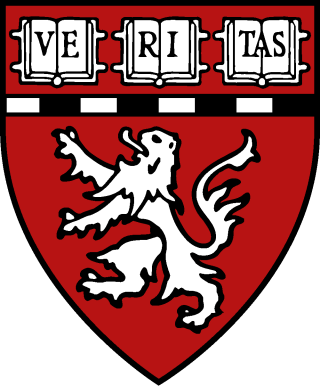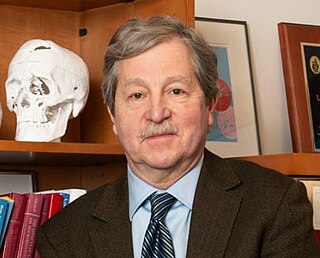Related Research Articles

Harvard Medical School (HMS) is the graduate medical school of Harvard University and is located in the Longwood Medical Area in Boston, Massachusetts. Founded in 1782, HMS is one of the oldest medical schools in the United States. Unlike most other leading medical schools, HMS does not operate in conjunction with a single hospital but is directly affiliated with several teaching hospitals in the Boston area. Affiliated teaching hospitals and research institutes include Dana–Farber Cancer Institute, Massachusetts General Hospital, Brigham and Women's Hospital, Beth Israel Deaconess Medical Center, Boston Children's Hospital, McLean Hospital, Cambridge Health Alliance, The Baker Center for Children and Families, and Spaulding Rehabilitation Hospital.
Alvaro Pascual-Leone is a Spanish-American Professor of Neurology at Harvard Medical School, with which he has been affiliated since 1997. He is currently a Senior Scientist at the Hinda and Arthur Marcus Institute for Aging Research at Hebrew SeniorLife. He was previously the Director of the Berenson-Allen Center for Noninvasive Brain Stimulation and Program Director of the Harvard-Thorndike Clinical Research Center of the Beth Israel Deaconess Medical Center in Boston.
Elkan Rogers Blout was a biochemist at Polaroid Corporation, Boston Children's Hospital, and the Edward S. Harkness Professor of Biological Chemistry, Emeritus at Harvard University.

Herbert Leroy Needleman researched the neurodevelopmental damage caused by lead poisoning. He was a pediatrician, child psychiatrist, researcher and professor at the University of Pittsburgh, an elected member of the Institute of Medicine, and the founder of the Alliance to End Childhood Lead Poisoning. Dr. Needleman played a key role in securing some of the most significant environmental health protections achieved during the 20th century, which resulted in a fivefold reduction in the prevalence of lead poisoning among children in the United States by the early 1990s. Despite engendering strong resistance from lead-related industries, which made him the target of frequent attacks, Needleman persisted in campaigning to educate stakeholders, including parents and government panels, about the dangers of lead poisoning. Needleman has been credited with having played a key role in triggering environmental safety measures that have reduced average blood lead levels by an estimated 78 percent between 1976 and 1991. He died in Pittsburgh in 2017.

Leon Eisenberg was an American child psychiatrist, social psychiatrist and medical educator who "transformed child psychiatry by advocating research into developmental problems".

The Boston University Chobanian & Avedisian School of Medicine, formerly the Boston University School of Medicine, is one of the graduate schools of Boston University. Founded in 1848, the medical school was the first institution in the world to formally educate female physicians. Originally known as the New England Female Medical College, it was subsequently renamed Boston University School of Medicine in 1873, then Chobanian & Avedisian School of Medicine in 2022. In 1864, it became the first medical school in the United States to award an M.D. degree to an African-American woman.

Norman Geschwind was a pioneering American behavioral neurologist, best known for his exploration of behavioral neurology through disconnection models based on lesion analysis.

The presence of mercury in fish is a health concern for people who eat them, especially for women who are or may become pregnant, nursing mothers, and young children. Fish and shellfish concentrate mercury in their bodies, often in the form of methylmercury, a highly toxic organomercury compound. This element is known to bioaccumulate in humans, so bioaccumulation in seafood carries over into human populations, where it can result in mercury poisoning. Mercury is dangerous to both natural ecosystems and humans because it is a metal known to be highly toxic, especially due to its neurotoxic ability to damage the central nervous system.
Martin L. Yarmush is an American scientist, physician, and engineer known for his work in biotechnology and bioengineering. After spending 4 years as a Principal Research Associate in Chemical Engineering at MIT, in 1988 he joined Rutgers University, where he currently holds the Paul and Mary Monroe Endowed Chair in Science and Engineering and serves as Distinguished Professor of Biomedical Engineering. Yarmush is the founding director of the Center for Engineering in Medicine & Surgery (CEMS) at Massachusetts General Hospital. He is also a Lecturer in Surgery and Bioengineering at Harvard Medical School, and a member of the Senior Scientific Staff at the Shriners Hospital for Children, Boston.
Clifford J. Woolf is professor of neurology and neurobiology at Harvard Medical School and director of the F.M. Kirby Neurobiology Center at Boston Children’s Hospital. He has added greatly to the understanding of pain.
Richard Eugene Frye is an American autism researcher and associate professor at Arizona Children's Hospital in Phoenix, and formerly of the University of Arkansas for Medical Sciences's department of pediatrics, as well as the Director of the Autism Multispecialty Clinic at Arkansas Children’s Hospital. Frye was formerly a faculty member at the University of Texas Health Science Center at Houston's division of child and adolescent neurology.
Philippe Grandjean is a Danish scientist working in environmental medicine. He is the head of the Environmental Medicine Research Unit at the University of Southern Denmark and adjunct professor of environmental health at the Harvard School of Public Health. Grandjean is also co-founder and co-editor-in-chief of the journal Environmental Health, and consultant for the National Board of Health in Denmark. He is known for his research into the developmental toxicity and adverse effects of certain environmental chemicals to which children are commonly exposed.

Charles A. Nelson III is an American neuroscientist and psychologist. His international projects include a long-standing project on institutionalized children in Romania, children growing up in a slum in Dhaka, Bangladesh, infants in Puerto Rico exposed to the Zika virus, and children growing up in challenging circumstances in Sao Paulo, Brazil. Dr. Nelson has also focused his research efforts on the development of memory and the ability to recognize facial expressions of emotion in infants and young children. Recently, Nelson was recognized for his on-going research with infants and children at high risk for developing autism spectrum disorder.

Dimitrios Trichopoulos, was a Mediterranean Diet expert and tobacco harms researcher. He was Vincent L. Gregory Professor of Cancer Prevention and Professor of Epidemiology, and a past chair of the Department of Epidemiology, in the Harvard School of Public Health in Boston.
Robert O. Pihl is an American psychology researcher, professor and clinician. Since 1966, he has worked at McGill University in Montreal, Canada. He is also a fellow of the American Psychological Association and Canadian Psychological Association, as well as a member of many other academic organizations.
Joseph J. Volpe is an American physician, the Bronson Crothers Professor of Neurology, Emeritus at Harvard Medical School and Neurologist-in-Chief Emeritus at Boston Children's Hospital. He was an early contributor to the field of neonatal neurology and has authored several editions of an influential textbook, Neurology of the Newborn.

Joel Salinas is an American-born Nicaraguan neurologist, writer, and researcher, who is currently an Assistant Professor of Neurology at Harvard Medical School. He practices general neurology, with subspecialty in behavioral neurology and neuropsychiatry, at the Massachusetts General Hospital in Boston, Massachusetts. He is also a clinician-scientist at the Harvard T.H. Chan School of Public Health and the Framingham Study at the Boston University School of Medicine.
Frederica Perera is an American environmental health scientist and the founder of the Columbia Center for Children's Environmental Health at the Columbia University Mailman School of Public Health. Her research career has focused on identifying and preventing harm to children from prenatal and early childhood exposure to environmental chemicals and pollutants. She is internationally recognized for pioneering the field of molecular epidemiology, incorporating molecular techniques into epidemiological studies to measure biologic doses, preclinical responses and susceptibility to toxic exposure.

Martin Kulldorff is a Swedish biostatistician. He has been a professor of medicine at Harvard Medical School since 2003, though on leave as of 2023. He is a member of the US Food and Drug Administration's Drug Safety and Risk Management Advisory Committee and a former member of the Vaccine Safety Subgroup of the Advisory Committee on Immunization Practices at the US Centers for Disease Control and Prevention.

Charles Franklin Barlow was an American pediatric neurologist. He was the Bronson Crothers Professor of Neurology at Harvard Medical School and Chair of Neurology at Boston Children's Hospital.
References
- 1 2 "David C. Bellinger, PhD". Physicians for Social Responsibility. Archived from the original on 9 March 2016. Retrieved 9 March 2016.
- ↑ "David Bellinger". Boston Children's Hospital. Retrieved 9 March 2016.
- ↑ Squires, Sally (18 October 2006). "Benefits of Fish Exceed Risks, Studies Find". Washington Post. Retrieved 9 March 2016.
- ↑ Cone, Marla (25 May 2007). "Scientists warn of toxic risk to fetuses". Los Angeles Times. p. 2. Retrieved 9 March 2016.
- ↑ Hamblin, James (18 March 2014). "The Toxins That Threaten Our Brains". The Atlantic. Retrieved 9 March 2016.